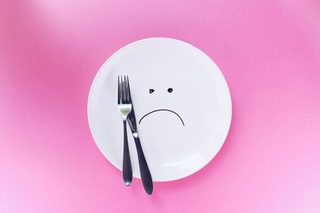Undereating means you’re eating less kilojoules than your body needs to maintain its’ current weight and support health. Sensibly reducing your kilojoule intake for a set period to reach a healthy weight is fine, but consistently failing to provide your body with adequate dietary energy (kilojoules) and the nutrients it needs over a prolonged time can have serious physical, psychological and behavioural effects and isn’t fun for anyone.

Undereating isn’t just dieting. It can be:
- Strict, sustained kilojoule restriction / dieting
- Severe eating restraint to try to keep weight under strict control
- Avoiding nutrient groups (e.g., carbohydrates or fats) based on fear that they will make you gain weight.
- Strict “clean eating” regimens that blacklist particular foods and food groups (e.g., animal products, dairy, meat, white flour, sugar) and leave you with an increasingly strict list of clean foods that are acceptable to eat.
- Overexercising without eating enough for your activity (this can be more common than you think).
It’s super important to realise that the effects of undereating can occur whether you are underweight, normal weight or overweight, but they’re likely to be more severe if you are underweight.
Mood and personality effects
When you undereat, your brain is the first organ to panic. When you don’t eat enough to keep your body fuelled, your brain flicks into survival mode – essentially switching off the parts of our brain responsible for conscious, intellectual, logical reasoning. Leaving you with your more basic “survival brain” in the driver’s seat. This has a massive impact on the way you think and feel – leaving you much less resilient to stress and unable to be spontaneous and relax. Mood is badly affected by under-eating. Under eaters generally feel depressed, low, and prone to be easily irritated or enraged. Panic attacks are a very common side-effect of undereating and are only likely to subside when you recover back to a healthier body weight.
Obsessive and compulsive behaviour is one of the most prominent behavioural changes of undereating. You may feel compelled to walk a certain distance or undertake several or prolonged workouts each day. If undereating continues indefinitely, social withdrawal, loss of sexual feeling and feeling fat (even if underweight) is common.
Mental and cognitive changes
Your ability to think clearly, set priorities and switch easily from one task to another is severely impacted if you consistently undereat. Your thinking can become inflexible, obsessive and irrational and you are more likely to be reactive to criticism and less able to show empathy or connect emotionally with others.
Behavioural changes
Undereating triggers powerful cravings, usually for foods rich in sugar and fat (because they are a quick and easy source of energy). Resisting these strong cravings uses up a huge amount of physical and mental energy. Your brain and body are doing all they can to alert you to the fact that they need more food. Research shows that cravings will continue until you are able to eat a diet that is nutritionally dense and provides enough kilojoules for your energy needs.
Undereating also makes you feel restless and agitated. Research shows that starving rats run on an activity wheel much more than those who are properly fed, leading to perpetual weight loss.
Physical effects
Your metabolism, heart and circulation, blood sugar levels, bone density, skin, sleep patterns as well as your body’s ability to keep warm can all be damaged by prolonged undereating. The mental, emotional and physical effects of prolonged undereating can occur even if you are in a healthy weight range or overweight but will be more severe if your weight and / or body fat levels are very low.
Personality
Undereating can change every aspect of your personality. Your personality, thoughts and feelings are directly affected by what you eat. Undereating might make you feel special and stronger (it may make you may feel like you are in control), but it takes a hell of a lot of willpower to ignore your body’s increasingly desperate pleas for food, and you get stuck in an internal war that will makes you unhappy, tired and unable to emotionally connect to your friends and family because you’re too busy fighting with yourself. These horrible feelings and symptoms – including self-hatred, shame, guilt and feeling fat, will begin to resolve if you are able to start eating enough again and regain a healthy body weight. If your body weight is already low, you may also require expert support to help you recover.
